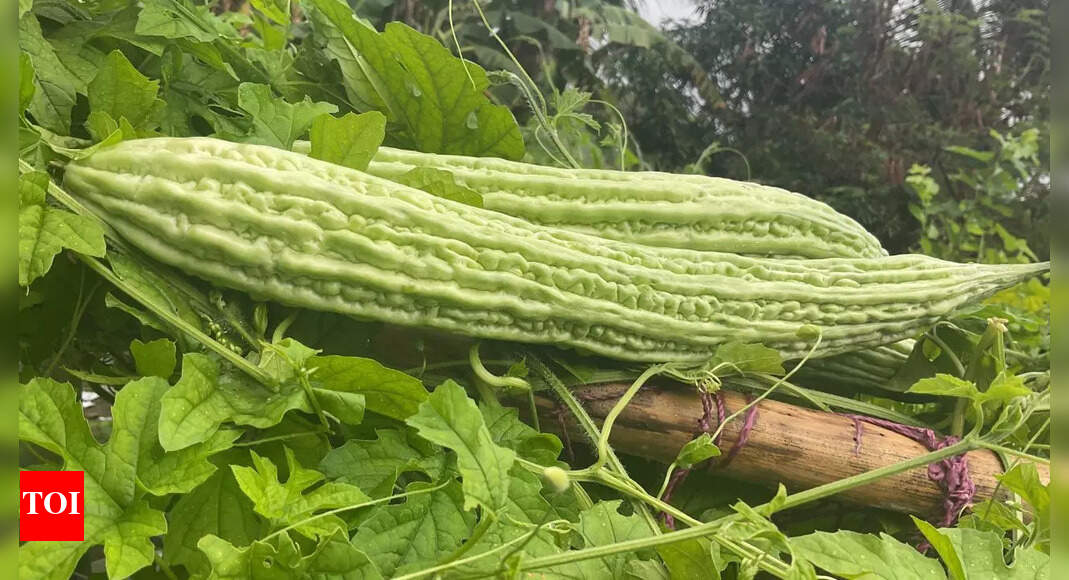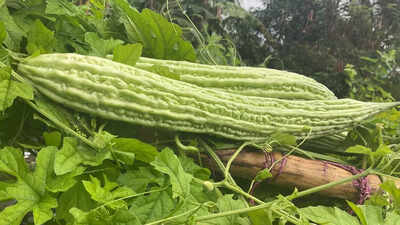
Karela leaves, derived from the bitter melon plant, are a powerhouse of nutrition and health benefits. Rich in vitamins A and C, folate, potassium, iron, and antioxidants, these leaves have been used traditionally for their medicinal properties. While the bitter melon fruit is widely recognised, the leaves offer concentrated nutrients that can support various aspects of wellness. From managing blood sugar and aiding digestion to boosting immunity, promoting healthy skin, supporting weight management, and detoxifying the body, karela leaves are a versatile and natural addition to a balanced diet. Simple cooking methods make them easy to include daily.
Nutritional profile of karela leaves
Karela leaves, derived from the bitter melon plant, are a nutrient-dense part of this traditional vegetable. These leaves are rich in essential vitamins such as A and C, folate, and minerals including potassium and iron. They also contain bioactive compounds and antioxidants that contribute to their health-promoting properties. While bitter melon fruit is well-known for its medicinal uses, the leaves offer a concentrated source of nutrients, making them an ideal addition to a balanced diet. According to a study published in the ResearchGate, karela (bitter melon) leaves are a rich source of essential nutrients. The study reports that the leaves contain approximately 27.38% protein, 2.19% lipids, 3.48% fiber, and 41.08% carbohydrates.
6 Health benefits of karela leaves
Help lower blood sugar levels
One of the most notable benefits of karela leaves is their ability to support blood sugar management. A study published in NIH, suggest that compounds in the leaves help improve insulin sensitivity and regulate glucose levels. For individuals with diabetes, incorporating these leaves into meals can complement medical treatment. It is important to monitor blood sugar closely, as the hypoglycaemic effect may be amplified when combined with diabetes medications. This makes karela leaves a functional food that may help reduce spikes in blood sugar and maintain more stable glucose levels.
Aid digestion and prevent constipation
Karela leaves are naturally high in dietary fiber, which aids digestion and promotes regular bowel movements. Fiber acts as a gentle cleanser for the digestive tract, helping to prevent constipation and supporting overall gut health. Including these leaves in daily meals can enhance satiety, reduce bloating, and improve nutrient absorption. For those prone to digestive discomfort, fiber-rich foods like karela leaves can play a preventive role while promoting long-term digestive wellness.
Boost the immune system
Rich in vitamin C, karela leaves contribute to a stronger immune system. Vitamin C enhances the body’s infection-fighting capabilities, stimulates white blood cell activity, and supports collagen production. Regular consumption of karela leaves can therefore help the body resist common illnesses such as colds and flu while promoting overall vitality. Their antioxidant content further protects immune cells from damage caused by free radicals, making these leaves a natural defence booster.
Promote healthy skin
The antioxidants found in karela leaves help maintain healthy, glowing skin. Free radicals can damage skin cells, accelerate ageing, and impair collagen production. By neutralising these harmful molecules, antioxidants in karela leaves support collagen synthesis, reduce inflammation, and improve skin elasticity. Consuming these leaves regularly may contribute to a clearer complexion and healthier skin from within, complementing topical skincare practices.
Aid weight management
Karela leaves are low in calories yet high in fibre, which makes them ideal for those looking to manage their weight. The combination of minimal calories and increased satiety helps reduce overeating and supports a balanced diet. By adding these leaves to soups, stews, or smoothies, individuals can enjoy filling meals without excessive caloric intake, which can contribute to gradual and sustainable weight management.
Support liver function and detoxification
Traditional medicine and modern research both highlight the potential liver-supporting properties of karela leaves. The bioactive compounds in the leaves may help in detoxifying the body and promoting overall liver health. By aiding the breakdown and elimination of toxins, these leaves contribute to systemic wellness and energy metabolism. Including them in regular meals can enhance the body’s natural detoxification pathways.
Precautions for consuming karela leaves
While karela leaves offer numerous benefits, certain precautions are important. Individuals with diabetes should monitor blood sugar levels closely due to the hypoglycaemic potential. Those with kidney issues should consume the leaves in moderation to avoid overburdening kidney function. Pregnant and breastfeeding women are generally advised to avoid karela, as it may cause complications. Additionally, people with allergies to the Cucurbitaceae family should refrain from consumption to prevent adverse reactions.
Simple ways to cook karela leaves
Karela leaves can be easily incorporated into daily meals. One popular method is to sauté chopped leaves with onions, garlic, and spices for a nutritious stir-fry that pairs well with rice or roti. Another option is to add the leaves to soups or stews, enhancing both flavour and nutrient content.
Blending into smoothies
For those who find the natural bitterness challenging, blending karela leaves into smoothies is an effective option. Combining them with fruits such as bananas or apples can mask the bitterness while retaining the health benefits. Smoothies provide a convenient way to include these leaves in your diet daily.
Making karela leaf chips
Another versatile preparation is to make karela leaf chips. By baking or air-frying thinly sliced leaves with a light seasoning of salt and spices, you can create a crunchy, nutrient-packed snack. This method offers a tasty alternative to processed chips while delivering the health benefits of the leaves.Incorporating karela leaves into your diet consistently can support multiple aspects of health. From lowering blood sugar levels and aiding digestion to boosting immunity, supporting skin health, promoting weight management, and detoxifying the body, these leaves offer a natural way to enhance overall wellness. By combining simple cooking methods, smoothies, and snacks, karela leaves can become a versatile and effective part of a heart-healthy, nutrient-rich diet.Disclaimer: This article is for general informational purposes only and is not a substitute for professional medical advice, diagnosis, or treatment. Always seek the guidance of a qualified healthcare provider regarding any medical condition or lifestyle change.Also Read: Avoid cross-contamination: 5 foods never to store together in the fridge








